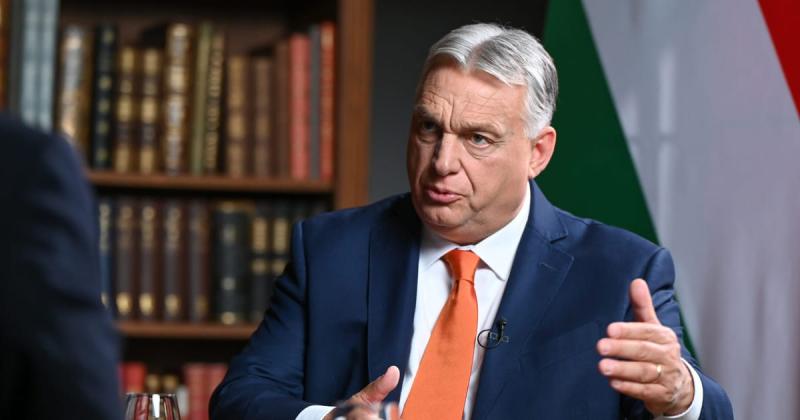EU officials fume over Orban's renegade diplomatic mission to see Putin
By: CSONGOR KÖRÖMI AND BARBARA MOENS (POLITICO)
Viktor Orban has been a busy little Prime Minister. Orban's whirlwind shuttle diplomacy between Kyiv, Moscow, and Beijing is reminiscent of a former President. Joe Biden eat your heart out. Of course, now the EU is trying to impose some Trumperized restraint on Orban with autocratic democracy.

Since Budapest took over the rotating EU presidency last week, Hungarian leader Viktor Orban has been zooming around like a cat on meth.
From Kyiv to meet his bete noire Volodymyr Zelenskyy, to Moscow for a chinwag with Russian leader Vladimir Putin, to Beijing to press flesh with Chairman Xi Jinping, the Hungarian prime minister has carried out a dizzying program of global diplomacy which, he says, is designed to bring peace to Ukraine.
But Orban's hyperactive hopscotching has left Europe's real presidents rolling their eyes, with European Commission chief Ursula von der Leyen and European Council boss Charles Michel both slamming the Hungarian leader as he steals their thunder and stirs the pot in Brussels.
The ruckus began on social media last Tuesday, day two of the six-month Hungarian presidency of the Council of the EU, with a hype video which purposely painted Orban as a man on a mission.
A grand motorcade blaring sirens and flashing blue and red lights en route "for peace." Dramatic music, action movie-style shots and — 2,100 kilometers later, in the capital of Ukraine — the man who claims he can prevent a world war appeared.
The music became more powerful as he arrived at the presidential palace in Kyiv. Orban sat down with Ukraine's President Zelenskyy for "three hours of negotiations," that ended with smiles on both sides and a press conference with a handshake.
Just three days later, Orban was off again — creating much greater controversy among EU leaders who insist he does not speak for them; that his role as Hungarian prime minister as it runs the Council of the EU is diplomatically irrelevant.
This time he offered the same hand in Moscow to Putin, Russia's bloodthirsty leader who has been waging war on Ukraine for years and threatening Europe's post-world-war security architecture.
Despite protestations from Brussels, Orban proudly declared that he had come to Moscow as an emissary of the European Union. "We cannot achieve peace without dialogue and diplomatic channels," Orban said in the Kremlin. "I have experienced that the positions are far from each other, but in terms of the restoration of dialogue the first important step was taken today." At the end of his travel video, the Hungarian presidency logo appeared with its Trumpian slogan: Make Europe Great Again.
Orban's visit to Putin, during which he appeared to lack some of the bravado apparent in his Kyiv video, had a boomerang effect, when on Monday morning Putin's forces bombed a children's hospital in Kyiv.
The renegade diplomatic mission has killed Hungary's EU presidency stone dead, according to one Brussels insider.
"Member states were already irritated by the 'MEGA' motto. But a meeting with Putin will permanently overshadow the Hungarian presidency," an EU diplomat told POLITICO on Friday, after being granted anonymity to discuss the sensitive issue. "With such a meeting the presidency ends before it has really begun."
But does Orban really care? Or is he using the presidency as a tool to act like what his supporters at home call him: The leader of Europe?
The man on a mission checked in from, whew, Beijing on Monday morning.
"China is the only world power that has been clearly committed to peace. This is important for Hungary and for the entire European Union," said Orban, genuflecting before Chinese President Xi Jinping who the U.S. — a NATO ally of Hungary — has accused of buttressing Russia's aggression in Ukraine.
But the real reason for Orban's whirlwind first week of the EU presidency could lie closer to home.
Orban's party, Fidesz, just suffered its weakest result in 15 years at the European election, and a new opponent has emerged. Peter Magyar was a longtime Orban ally, but in February he turned against the Budapest establishment, started a public movement that became a party — and snagged almost 30 percent of the vote at the ballot box. It was the strongest showing by an opposition party in Hungary in the last 15 years.
After a severe recession and an empty budget, Orban has little to offer the public that could win him support. He could, however, present himself as a "peacemaker," just as he did during the election campaign.
"Orban has traditionally been constructing an expanding foreign policy narrative practically since 2014-15. The current obvious outgrowth of this is the 'Peace Mission' narrative, which is also about pursuing his own economic interests, and which he built up very heavily for his own voter base in the last election," Botond Feledy, a geopolitical analyst at Red Snow, told POLITICO.
But Orban's tactics could also turn against him. EU ambassadors will discuss the presidency and his recent trips at their meeting Wednesday in Brussels, in a first sign that EU officials could move from public condemnations alone to concrete action to restrain Budapest's presidency.
According to a second EU diplomat, there are growing concerns about Orban. "It should be clear that he is only representing his own country, but instead he deliberately left a lot of ambiguity," the diplomat said.
Hungary continues to block funding to help Ukraine get money to purchase weapons from the EU. | Roman Pilipey/Getty Images
The diplomat added that tensions are running high after the first week of the presidency and are expected to rise further approaching the Foreign Affairs Council on July 20, as Hungary continues to block funding to help Ukraine get money to purchase weapons from the EU.
A third EU diplomat, who was also granted anonymity to speak freely, told POLITICO: "We are now discussing what exactly to do on Wednesday. There is a very clear political disapproval."
It's unlikely that Brussels has the appetite to try smack Hungary over Orban's global grandstanding immediately, though analysts say there are mechanisms to deprive Orban of the presidency.
"If they show determination to give a proper response to Orban's 'shock and awe' diplomacy aimed at trolling and ridiculing the EU, they can get rid of the Hungarian presidency within weeks," wrote Daniel Hegeds, a senior fellow at the German Marshall Fund.
It would take a qualified, four-fifths majority in the European Council to rewrite the schedule of rotating presidencies and shift the start date of the upcoming Polish presidency by several months.
Orban, for his part, shows little sign of heeding Brussels' calls for restraint — and attempts to terminate his command. He continues to carry out a punishing travel schedule that would make Taylor Swift weep: He's already on his way to Washington for this week's NATO summit.







Orban, Putin, and Xi are the dynamic trio advocating a pragmatic peace in Ukraine.
Notice that Joe Biden and the United States aren't even mentioned. So much for that old-time free world leadership. Like sand through the hourglass so are the days of Joe Biden's Presidency.
Orban and Xi are only interested in Putin's oil and gas and in Orban's case probably drooling over possibly annexing Carpathia.
Wow. I've never read a greater distortion of reality. Neville Chamberlain must be your model of a pragmatic peacemaker. He and Hitler worked out a great deal over Czechoslovakia, right?
The 1939 Molotov-Ribbentrop non-aggression pact between Hitler and Stalin that divided Poland and Lithuania might be more apt for the current moment. The EU/NATO and Russia are dancing around to determine how Ukraine will be divided.
Neville Chamberlain didn't have any skin in the game and was trying to keep British troops out of the fight. Chamberlain's appeasement wasn't about maintaining peace or defending Europe. Chamberlain didn't want to get sucked into another quagmire like WWI. And it might have worked if continental Europe had invested more in its own defense instead of depending upon the United Kingdom to come to the rescue.
In actuality, Russia wants to absorb all of Ukraine and the EU/NATO want to keep Ukraine whole and independent.
You have that wrong, too.
"At Munich, Chamberlain got an international agreement that Hitler should have the Sudetenland in exchange for Germany making no further demands for land in Europe. Chamberlain said it was ‘Peace for our time’."
.